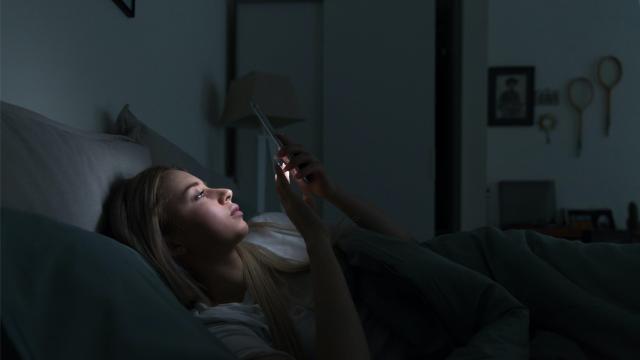When it begins to get dark out, you might notice your phone screen shifts to a more orange tone to help you prepare for sleep. Our bodies expect to only see blue light during the day, the theory goes, so blocking blue light at night should help us wind down and feel more tired when it’s time for bed.
It is true that using your phone at bedtime will probably interfere with your sleep, but can a colour change really reverse that effect? Not likely, according to new research that backs up what experts have been saying for years.
What we’ve learned recently
In the new study, college students were assigned to one of three conditions: putting away their iPhone during the hour before bedtime, using their iPhone with Night Shift enabled, or using their iPhone without Night Shift. There were no differences among the three groups in sleep quality as measured by an activity tracker.
“Taken together, our study findings paired with the previous literature does not support blue light filters (such as Night Shift) as sleep improving interventions, whether measured by sleep characteristics (e.g., sleep duration, sleep-onset latency, melatonin onset, or minutes spent in rapid-eye movement sleep,” the investigators write.
College students are notoriously sleep-deprived, though, so the researchers wondered if maybe the participants were so tired that they had no problem falling asleep no matter what they did with their phones. When they looked at the people who got more than the average amount of sleep — in other words, those who were less likely to be sleep-deprived — they found a difference in sleep quality between people who used their phones before bed and those who didn’t, but once again the use of Night Shift didn’t seem to make a difference.
What we already knew
Night Shift (and its equivalents on Androids and computers) is based on science that made sense, but had not been rigorously tested in the real world back when it was introduced. Here’s a Lifehacker piece from 2016, for example, when these modes were just beginning to catch on, where we noted that while science supported the idea that blue light may interfere with sleep, we don’t know if tinting your display orange would actually fix the problem.
Today, blue light has gotten an even worse reputation, but the science to support it hasn’t really shown up. Optometrists and ophthalmologists keep trying to tell us that blue light from screens doesn’t have any serious detrimental health effects, and they don’t recommend Night Mode as a cure-all for smartphones interfering with our sleep.
In short, go ahead and use Night Mode to help you wind down in the evening, the American Academy of Ophthalmology says, but you should still put your phone away an hour or two before bed to keep it from interfering with your sleep.

Leave a Reply
You must be logged in to post a comment.